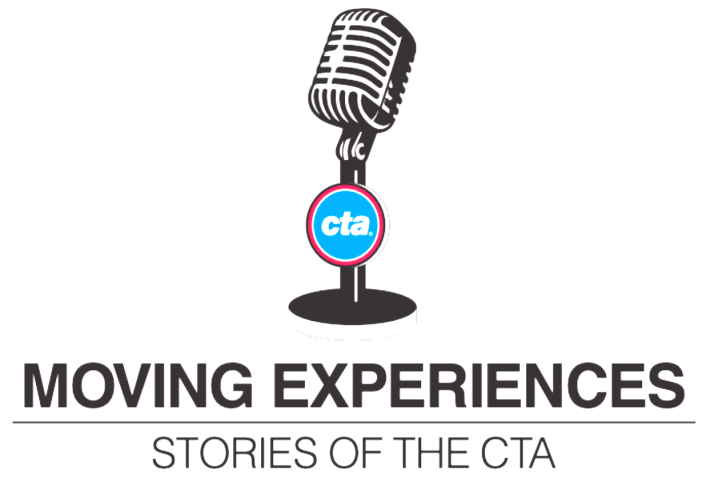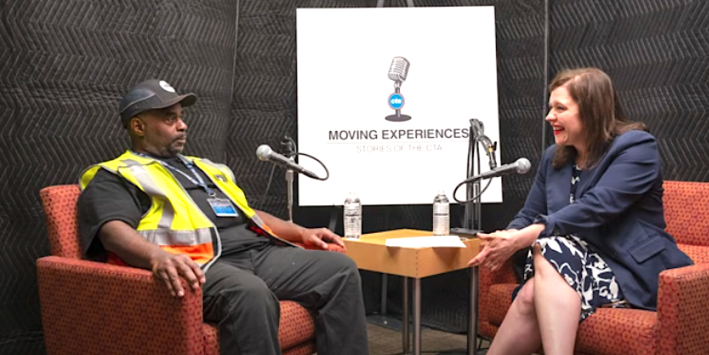
Chicago Transit Authority has joined the podcast fray.
As of this spring, CTA launched its own monthly pod called “Moving Experiences: Stories of the CTA." Rather than random stories from transit users, the podcast’s hook so far is its focus on the actual backbone of CTA: its workers.
One question that comes to mind is, who is the target audience for this podcast? Is it for other CTA staff? Fans of CTA and/or transit in general (no doubt a smallish but mighty group)? Did they just feel like they probably should have a podcast by now? Is it another marketing tool? All of the above?
"Every kind of work at CTA is incredibly impactful, and on this podcast, we will hear from the people who make that impact every day" explains Acting President Nora Leerhsen in the podcast’s introduction. "The idea for this podcast came from my interest in hearing stories of the CTA from its employees, its riders, and the people who love the system," said Leerhsen in the show’s press release. "We're going to be introducing you to those people and having engaging discussions about transit and our great agency."
While the first two one-hour episodes feature conversations between Leerhsen and employees, future guests may also include "thought leaders in the public transit industry," the release states.

In the first episode, "You Just Happen to be a Woman," Leerhsen talks with Director of Bus Operations, Arlana Johnson and Vice-President of Rail Operations, Jeannie Alexander. They have a leisurely and jovial time covering the two women’s personal histories, how exactly they first got hired at the agency, and how they have moved up through the ranks.
Leerhsen starts the episode strong by recognizing both Alexander and Johnson as role models to her when she was first hired as acting president. Then she invites them to share their life and work experiences. Both recall using CTA from childhood, taking the trains and buses to school and their earliest jobs around town, before being hired by CTA in the 1990s.
Johnson, from Auburn-Gresham, recalls, "I took CTA to and from school and then work at the Sears Tower," for her first real job after high school. "Matter of fact, some of the guys that were fare collectors at the [bus] back doors when I went to high school, I eventually wound up working with them when I first started at CTA."
"Wow!" interjects Leerhsen.
"So I knew them when I was a kid, and now we’re working together side-by side," John says.
"That’s so neat!" Leerhsen replies.
Alexander started as a college intern at one of the "currency counters" on Division, back when the system operated on tokens only. She’s a third generation CTA employee: Her grandparents, her mother and her sister all worked there and were instrumental in her motivation. "Being raised by bus operators, I knew that time was essential, so I knew that I should be at work at 'oh-530!'" She jokes that she was introduced to "executive sessions" around the family table at Thanksgiving. Her relatives often shared stories from their jobs which inspired her to continue in the agency.
April’s episode, "Living Proof," features Sidney Pruett, a train operator who advanced to his current position through CTA’s Second Chance program. Leehrsen explains the program "provides job skills and career opportunities to Chicago residents who face challenges re-entering the workforce." Since its launch in 2008, at least 3,000 of the agency’s 11,400 employees were hired through the Second Chance program.

"For many, CTA has been a place to start again, when their ability to find gainful employment is hampered by a past that involves incarceration or other life challenges, such as domestic violence or homelessness, that can be barriers to getting their lives back on track," explains the YouTube caption for the episode. The program is a one year minimum commitment, and two year maximum, and participants must be referred by a partner agency. It is intended to be holistic, with additional resources and support systems outside of the eventual job placement.
Pruett shares his story with Leerhsen, and how joining and sticking with the two-year Second Chance program helped him secure his growing career with CTA.
After his father died some years back, Pruett’s grief led to a deep depression. He explains, "Some people need therapy after losing someone…I didn’t get it." He tells how he "caught a case and was put on 10 years’ probation," after which he had a few smaller jobs. Once he got into the Second Chance program, "it was a great experience, learning and meeting a lot of good people." He adds that patience and commitment to the program were key to completing it. He started as a bus apprentice, detail-cleaning buses in the garage for about a year, and was then moved up to car service. Pruett concludes, "It offered me security and stability, financially, and with opportunities to grow even more, as you stay onboard with CTA."
In the latter half of the episode, Leerhsen speaks with the coordinator of the Second Chance program, Kim Robinson. Robinson is Vice President of Training and Workforce Development, and a 24 year CTA veteran. Notably, just like the other guests thus far, Robinson points out how she grew up using CTA, and her family’s deep history of CTA employment. As a child, she remembers seeing her father head to work in his (then) green uniform every day. She details her career growth and her deep knowledge of the agency, including her department’s efforts to "upskill" and drive talent into new areas so that employees "don’t have to be stuck in a box if they don’t want to be."
Leerhsen says she is also proud how the Second Chance program has broadened in recent years from focusing primarily on formerly incarcerated folks returning to employment, to addressing other barriers as well, such as addiction or homelessness.
Explaining how it’s personal to her, Leerhsen says she came to CTA as a legal intern "with the hope of influencing the type of policy that corrects the wrongs of our country’s past in terms of disinvestment and mass incarceration, and the impact that continues to have for generations."
"One of the first things I worked on was revising our background check policy to reflect current changes in federal law that no longer allowed employers to not hire people because of a criminal background…But we can’t stop there. The challenges people face are dynamic and need a full approach. So it’s not enough to just change the law. We should be supporting people in full, robust ways and that’s what we’re doing here at CTA."
Episodes of "Moving Experiences: Stories of the CTA" are available on most major podcast services, as well as at http://transitchicago.com/podcast.

Did you appreciate this post? Streetsblog Chicago is currently fundraising to help cover our 2025-26 budget. If you appreciate our reporting and advocacy on local sustainable transportation issues, please consider making a tax-deductible donation here. Thank you!




